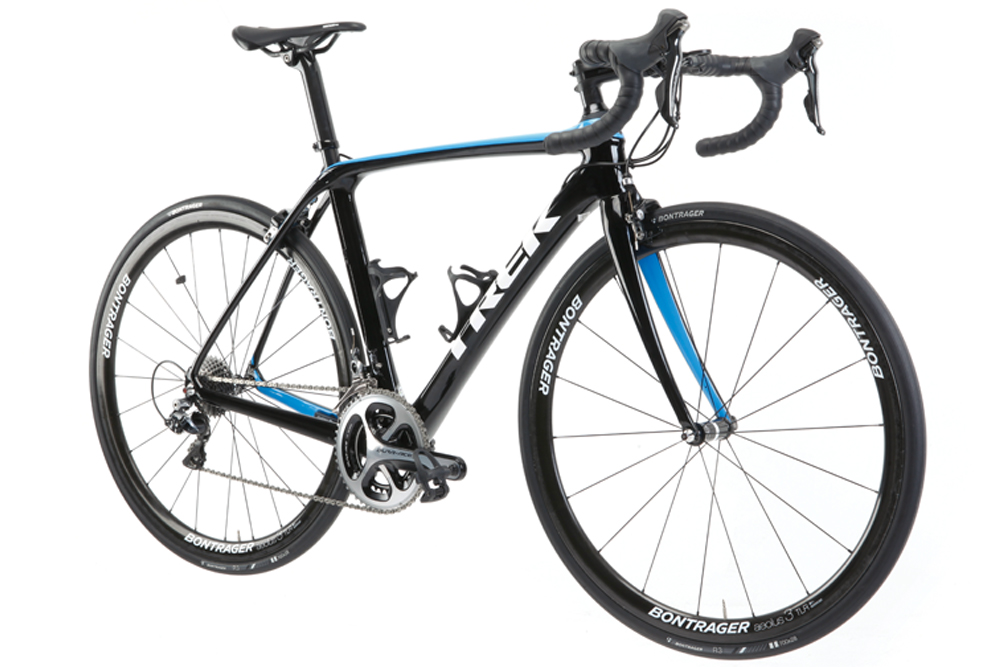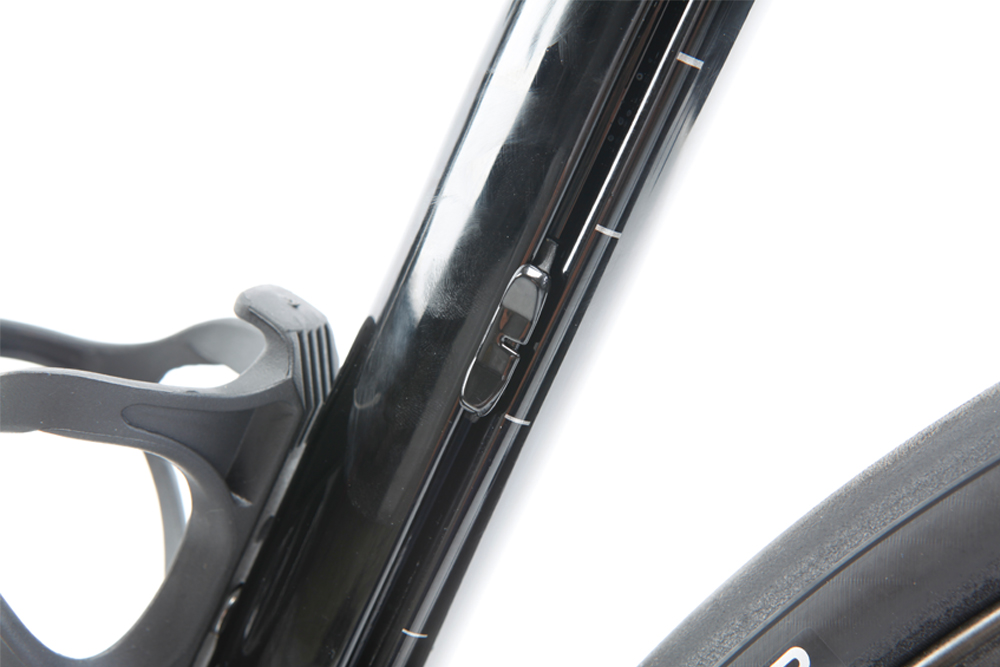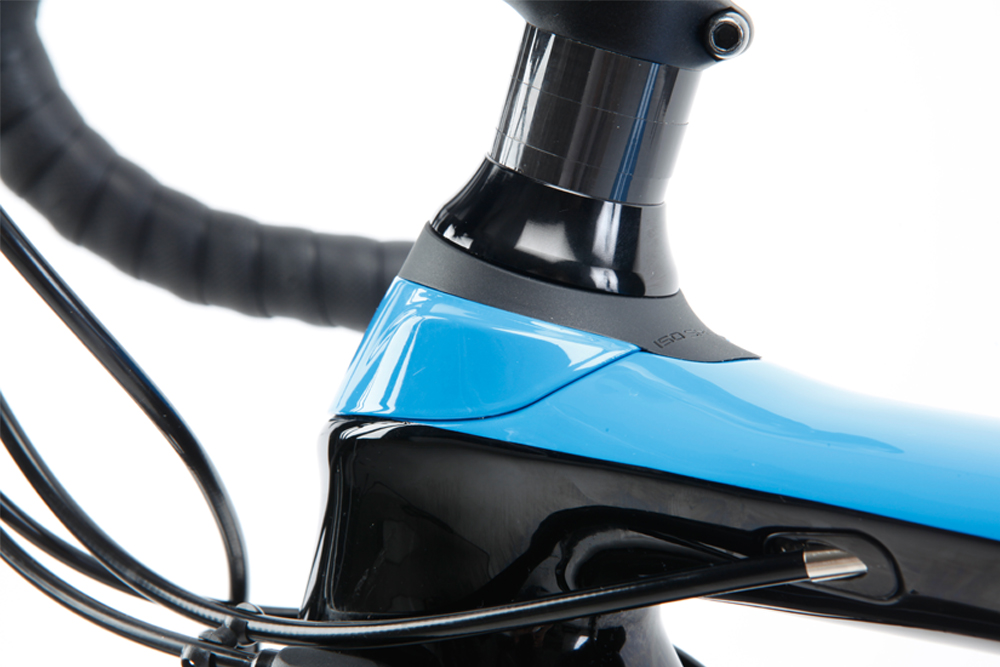Trek Domane SLR review
Slider down the side of seat tube lets you alter the ride quality

Test bikes come and go here at Cycling Weekly, but the Trek Domane SLR was a bike that I kept coming back to throughout the summer between testing other models, long after I’d formed a definitive opinion on it and had finished making my notes. The ability to change the bike’s ride characteristics using a little slider on the side of the seat tube might sound gimmicky, but you can’t argue with performance. This is a bike with a rear end that can be compliant to smooth out rough roads, or stiff for efficient power transfer when riding in the saddle. This is complemented by technology at the front of the bike that while non-adjustable still manages to smooth out vibrations without detracting too much from a design geared towards racing. If you’re after a bike that will put you at the front of races and keep you comfortable on six, seven, eight-hour rides, then the Trek Domane SLR is hard to beat
-
+
Incredibly versatile
-
+
Comfortable on long rides
-
+
Great power transfer
-
+
Excellent wheels
-
-
Tyres cut easily
-
-
No adjustability on lower models
You can trust Cycling Weekly.
Over the last few years, the original Trek Domane has established itself as one of the leading endurance bikes on the market.
Now Trek has released a new model, with a standout feature that sets it apart from everything else available today.
Frame

The standout feature of the Trek Domane SLR is the adjustable rear IsoSpeed decoupler. In effect the bike has an extended seatpost that sits behind a cut out seat tube, with the two attached using a pivot bolt at the junction with the seatstays and the top tube, and a second bolt that also doubles as the bottom bottle cage bolt.
This apparently gives the new bike an adjustment range of 20 per cent of compliance. This means that the bike can go from being as stiff and relatively uncompliant as Trek’s other race bikes, the Madone and Emonda, to being up to 14 per cent more compliant than the old Domane.
Adjustment is done via a slider which runs between the two tubes: move the slider to the top to get a stiffer, less compliant ride similar to the Madone and Emonda, and move it to the bottom to get the most comfortable rider that the Trek Domane SLR can offer.
A similar IsoSpeed technology is used at the front, where the fork steerer tube is isolated, allowing it to rotate independently. This means a front end that is, according to Trek, 5-10 per cent more compliant than that of its predecessor.

Aside from IsoSpeed there are a number of extra comfort features built into the new Trek Domane SLR. First up are the IsoCore handlebars, which have a rubber compound woven into the carbon-fibre to dissipate road vibrations, meaning a claimed 24 per cent benefit over aluminium bars and 20 per cent benefit over standard carbon bars.
The latest race content, interviews, features, reviews and expert buying guides, direct to your inbox!
The bike also has a new IsoSpeed fork (with 12mm thru-axles on the disc brake versions), with the positioning of the dropouts apparently increasing compliance by 7 per cent compared to a standard road fork.
Other than the IsoSpeed technology, the Trek Domane SLR comes with a whole host of other features that come together to create what Trek reckons will be its most versatile road bike ever.
For all that talk of extra compliance and comfort, Trek has also redesigned the down tube of the new bike, giving it a curved look and making it wider, apparently meaning better power transfer.
Specification
Our Domane SLR test bike came with a top-end build that meant a Shimano Dura-Ace groupset with rim brakes rather than discs.
For those deciding whether to make the switch, there are a big selection of disc brake bikes throughout the Domane range, but it is good to see that Trek, unlike Specialized with its new Roubaix, is still giving customers a choice of which braking system to go with.
The wheels were a pair of tubeless-ready Bontrager Aeolus 3 clinchers topped with 28mm Bontrager R3 Hardcase Lite tyres. While the wheels were excellent, providing a fast yet comfortable ride, the tyres cut very easily and would be the first thing we would change.
Ride
I came to the Trek Domane SLR with two preconceptions; firstly that it is an endurance bike, and secondly that the slider was a gimmick. On both counts the bike proved me wrong.
The difference in the ride between having the slider at the top and having it at the bottom is profound. Move it all the way to the bottom and you get a super-comfortable endurance bike with a compliant rear end that is the equal of any other endurance bike on the market.
I’ve ridden this bike on the cobbles of Flanders, and with the slider at the bottom it was seriously smooth, while the IsoSpeed system at the front helped to keep my hands and wrists in decent shape, even while riding without gloves.
But move the slider and the Domane SLR is no longer an endurance bike. Back in Blighty, and with smoother roads and faster rides on the agenda, I moved the slider all the way to the top and turned it into an out-and-out race bike.
Power transfer through the bottom bracket and rear end is absolutely superb, with the bike rocketing along even with the 28mm tyres.
At the front, when sprinting I didn’t experience the handlebars bobbing up and down as expected, although I can’t claim to have fully pushed this to the limits as I’m a relatively light rider.
In practice I found myself generally setting the slider at its mid-point and leaving it there for most rides, but it’s always nice to have the option to switch things up or down to create a horse that will run well on any course.
How to ride the cobbles
Value
I’m torn over the value on offer by the Trek Domane SLR. Seven thousand pounds is a lot of money to spend on a bike, but the Trek goes a long way to justifying that price tag with the ability to double up and perform just as well in a road race as it would on a 200km Audax over sketchy lanes.
My frustration is that the slider that makes this bike so versatile is only available on top-end Domanes — the most affordable bike with this technology costs £3,600 and comes with basic alloy wheels and second-tier Shimano Ultegra.
Henry Robertshaw began his time at Cycling Weekly working with the tech team, writing reviews, buying guides and appearing in videos advising on how to dress for the seasons. He later moved over to the news team, where his work focused on the professional peloton as well as legislation and provision for cycling. He's since moved his career in a new direction, with a role at the Department for Environment, Food and Rural Affairs.